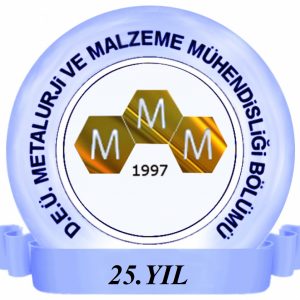- Anasayfa
- About Department
- Introduction

Introduction
Dokuz Eylül University, Engineering Faculty, Metallurgical and Materials Engineering Department was established in 1997 as the first Metallurgical and Materials Engineering Department in the region by the Academicians of the Construction and Manufacturing Division of the Mechanical Engineering Department. Since its establishment, 15 laboratories have been set up by the projects supported by the State Planning Organization, TUBITAK, and the University Scientific Research programs. In its first academic year of 1999-2000, 30 students were enrolled. The quota of formal education is increased to 73 and has remained unchanged to date. Formal education in the department is supported by 30% English. In addition to undergraduate education, MSc and PhD Programs of Metallurgical and Materials Engineering are also available in the Graduate School of Natural and Applied Sciences. The language of education in MSc and PhD Programs is Turkish.
The objectives of the Bachelor s degree program are to educate Metallurgy and Materials Engineers who are able to design, manufacture, characterize and perform applications in the field of Metallurgy and Materials Engineering, define engineering problems, design and select appropriate materials, products and processes and take part in research and development studies, apply energy, cost, environmental, occupational health and safety issues through innovative and sustainable approaches at every stage of the life cycle of a given material, access target information, use their knowledge correctly and have an awareness of the importance of lifelong learning, have universal, social and professional ethical values and an awareness of environmental protection, cooperate and work in teams, and communicate effectively orally and in writing. For this purpose, students are subjected to vocational courses such as Materials Science, Materials Characterization, Metallurgical Thermodynamics, Physical Metallurgy, Chemical Metallurgy, Foundry Technology, as well as basic science courses and Social/Technical elective courses of the Faculty. Students who are successful in an undergraduate program may complete a double Major Program in Mechanical, Mining, Textile, Computer, and Geophysical Engineering Departments. Students of the Mining, Mechanical, and Textile Engineering departments may apply to the minor program in our department, whereas our students may enroll in the minor programs of Geophysical, Textile, Mining, Computer, and Mechanical Engineering departments. A second engineering program diploma and a minor program certificate are issued to students who have completed double major and minor programs, respectively. Educational status of the department is evaluated and accredited by the Association for Evaluation and Accreditation of Engineering Programs (MÜDEK). Bologna Process (European Higher Education Area alignment studies), which provides easy circulation to citizens of European Higher Education Area countries in Europe with the aim of getting higher education or working in Europe, started in 2010. The objectives and outcomes of the Bachelor’s degree program, which are determined in the framework of MUDEK, are updated accordingly to the feedback of the associates of the department and the expectations of the European Education area. Our University is eligible to receive the Diploma Supplement Label in 2012 and the ECTS Label in 2013. All our students who have graduated, in order to cover our students who started their education in the 2005-2006 academic year and afterwards, will receive a Diploma Supplement with their Diplomas free of charge. The department has four bilateral agreements within the ERASMUS Students and Scholars Exchange Program by year 2014 and aims to increase the knowledge and experiences by supporting the exchange of students and academics through bilateral agreements with qualified institutions which has an International reputation. The Metallurgical and Materials Engineering Department serves the public, industry, and private sector organizations with qualified and experienced academic and technical staff, advanced laboratories, and research facilities. In the Department, 15 laboratories (Mechanical Testing, Metalography, Characterization, Ceramic, Plastic Forming, Sample Preparation, Chemistry, Corrosion, Casting, Heat Treatment, X-Ray, Electronic Materials, Tribology, Simulation and advanced materials) operate in order to maintain educational and research activities.
The academic plan of the department, which is supported by 30% English, includes a total of 160 credit hours of classes composed of 144 hours of theoretical lectures and 32 hours of laboratory and applications. 16 courses in the curriculum is given in English. The Academic Plan is composed of 48 compulsory and 8 elective courses. A total of 46 courses is included in the elective course pool of the department. In addition, faculty electives of 49 non-technical social courses and 35 technical courses are available. The required courses / elective courses ratio in the Curriculum is 208 / 32 ECTS. The students have to take 8 ECTS of elective courses from the Faculty Elective Courses Plan.

